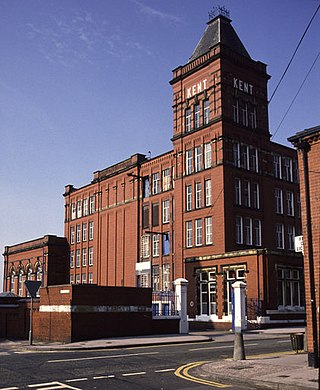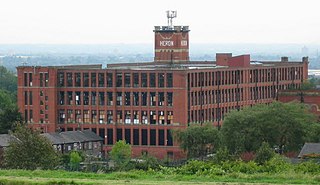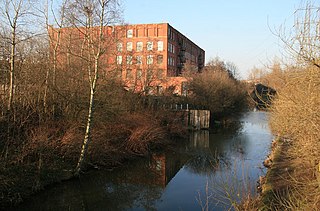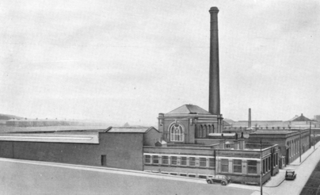
Regent Mill, Failsworth is a Grade II listed former cotton spinning mill in Failsworth, Oldham, Greater Manchester, England. It was built by the Regent Mill Co Ltd. in 1905, and purchased by the Lancashire Cotton Corporation in 1930. It was taken over by the Courtaulds Group in 1964. On ceasing textile production it was occupied by Pifco Ltd, and then by Salton Europe Ltd who now occupy this site. It was driven by an 1800 hp twin tandem compound engine by Buckley & Taylor. It became a ring mill with 60,000 spindles in 1915, all provided by Platt Brothers.

Rutland Mill was a cotton spinning mill on Linney Lane, in Shaw and Crompton, Greater Manchester, England. It was built by F. W. Dixon & Son in 1907 for the Rutland Mill Co. Ltd. It was taken over by the Lancashire Cotton Corporation in 1935. By 1964, it was in the Courtaulds Group. In the late 1980s, as Courtaulds moved operations to other parts of the world, the mill was bought by Littlewoods who demolished it and replaced it with a new automated storage warehouse.
Magnet Mill, Chadderton is a cotton spinning mill in Chadderton, Oldham, Greater Manchester. It was built by the Magnet Mill Ltd. in 1902, but purchased by the Lancashire Cotton Corporation in 1935. It was later taken over by the Courtaulds Group. Ceasing textile production in December 1966, it was demolished soon after. A suburban residential estate now occupies this site. It was driven by a 2200 hp twin tandem compound engine by George Saxon & Co, Openshaw, 1903. It had a 27-foot flywheel with 35 ropes, operating at 64½ rpm.

Ace Mill is a cotton spinning mill in Chadderton in the Metropolitan Borough of Oldham, Greater Manchester. It was built as Gorse No. 2 Mill, in 1914 and cotton was first spun in 1919 by the Ace Mill Ltd, who renamed the mill. It was taken over by the Lancashire Cotton Corporation in the 1930s and passed to Courtaulds in 1964. Production ended in 1967.

Brunswick Mill, Ancoats is a former cotton spinning mill on Bradford Road in Ancoats, Manchester, England. The mill was built around 1840, part of a group of mills built along the Ashton Canal, and at that time it was one of the country's largest mills. It was built round a quadrangle, a seven-storey block facing the canal. It was taken over by the Lancashire Cotton Corporation in the 1930s and passed to Courtaulds in 1964. Production finished in 1967.

Fox Mill was a cotton spinning mill in Hollinwood, Oldham, Greater Manchester, England. It was taken over by the Lancashire Cotton Corporation in the 1930s and passed to Courtaulds in 1964.

Royton Ring Mill was a cotton mill in Royton, Greater Manchester, England. It was built in 1908 and extended in 1912. It was taken over by the Lancashire Cotton Corporation in 1935 and passed to Courtaulds in 1964. Production finished in 1966. It was extended again in 1969 and used for other purposes. It has now been demolished, the street has been renamed and houses have replaced it.

May Mill was a cotton spinning mill in Pemberton, Wigan, Greater Manchester, England. Historically in Lancashire, it was built in 1889. It was taken over by the Lancashire Cotton Corporation in the 1930s and passed to Courtaulds in 1962–63 to produce carpet fibre, which it continued to do until its closure on 17 October 1980.

Kent Mill, Chadderton was a cotton spinning mill in Chadderton, Oldham, Greater Manchester. It was built in 1908 for the Kent Mill Co. It was taken over by the Lancashire Cotton Corporation in 1938 and passed to Courtaulds in 1964. Production finished in 1991 and it was demolished in 1994.

Heron Mill is a cotton spinning mill in Hollinwood, Oldham, Greater Manchester. It was designed by architect P. S. Stott and was constructed in 1905 by the Heron Mill Company Ltd next to Durban Mill. It was taken over by the Lancashire Cotton Corporation in the 1930s and passed to Courtaulds in 1964. Production ended in 1960, and it was used by Courtaulds for offices, warehousing, and some experimental fabric manufacture. Courtaulds occupation ended in 1994 with the Andrew Design Procurement further holding the site until 1998.

Textile Mill, Chadderton was a cotton spinning mill in Chadderton, Oldham, Greater Manchester, England. It was built in 1882 by Potts, Pickup & Dixon for the Textile Mill Co. Ltd, and closed in 1927. It was taken over by the Lancashire Cotton Corporation in the late 1940s and passed to Courtaulds in 1964 and used for cotton waste sorting. Half of the building was destroyed by fire on 11 July 1950, but the remaining section continued to be used for cotton waste sorting by W. H. Holt and Son until 1988.

Elm Mill, was a four-storey cotton spinning mill in Shaw and Crompton, Greater Manchester, England. It was built in 1890 for the Elm Spinning Company Ltd., and was called Elm Mill until it closed in 1928. It was revived by the Lancashire Cotton Corporation in 1929 and called Newby Mill. LCC and all their assets passed to Courtaulds in 1964. Production at Newby finished in 1970, and it was used for warehousing. Subsequently, named Shaw No 3 Mill, it became part of Littlewood's Shaw National Distribution Centre. It was demolished to make way for housing in 2022.

Royd Mill, Oldham was a cotton spinning mill in Hollinwood, Oldham, Greater Manchester, England. It was built in 1907, and extended in 1912 and 1924. It was taken over by the Lancashire Cotton Corporation in the 1930s and passed to Courtaulds in 1964. Production finished in 1981. The mill was demolished in 2015 to make way for a "DifRent" housing scheme.
Majestic Mill, Waterhead is a cotton spinning mill in Waterhead, Oldham, Greater Manchester. It was built in 1903. It was taken over by the Lancashire Cotton Corporation in the 1930s and passed to Courtaulds in 1964, converted to ring spinning in 1971. Production finished in 1982. Still standing in other use.

Malta Mill, Middleton is a former cotton spinning mill in the Mills Hill area of Chadderton, Greater Manchester. It lies alongside the Rochdale Canal. It was built in 1904 as a new mule mill, by F. W. Dixon The engine stopped in 1963. The building still stands.

Laurel Mill was a cotton spinning mill in the Mills Hill/Middleton Junction area of Chadderton, Oldham, Greater Manchester, England.

Junction Mill, Middleton Junction is a cotton spinning mill at Middleton junction, Chadderton in Greater Manchester alongside the Rochdale Canal.

Harp Mill was a former cotton spinning mill in the Castleton, Rochdale, Greater Manchester, England. Queensway, Castleton was a hub of cotton mills including the three 't', Th'Arrow, Th'Harp, and Th'Ensor. The 1908 Castleton map includes: Marland Cotton Mill, Castleton Cotton Mill, Globe Works, Arrow Cotton Mill, Harp Cotton Mill, Globe Leather Works, Castleton Size Works and Castleton Iron Works. Th'Harp was built in 1908 for the Harp Doubling Company and was taken over by the Lancashire Cotton Corporation in 1938. The mill closed in 1958, and was sold to the hosiery manufacturer N. Corah Ltd.

Mars Mill was a former cotton spinning mill in Castleton, Rochdale, Greater Manchester, England. Castleton joined the Borough of Rochdale in 1899. Queensway, Castleton was a hub of cotton mills; Mars, Marland, and Castleton Mill were a group of three. It was taken over by the Lancashire Cotton Corporation in 1935 and passed to Courtaulds in 1964 and demolished in the 1990s; Marland survived until 2004.

Kingston Mill, Stockport is a mid nineteenth century cotton spinning mill in Edgeley, Stockport, Greater Manchester, England. It was taken over by the Lancashire Cotton Corporation in the 1930s and passed to Courtaulds in 1964. Production finished, it was made over to multiple uses.
























